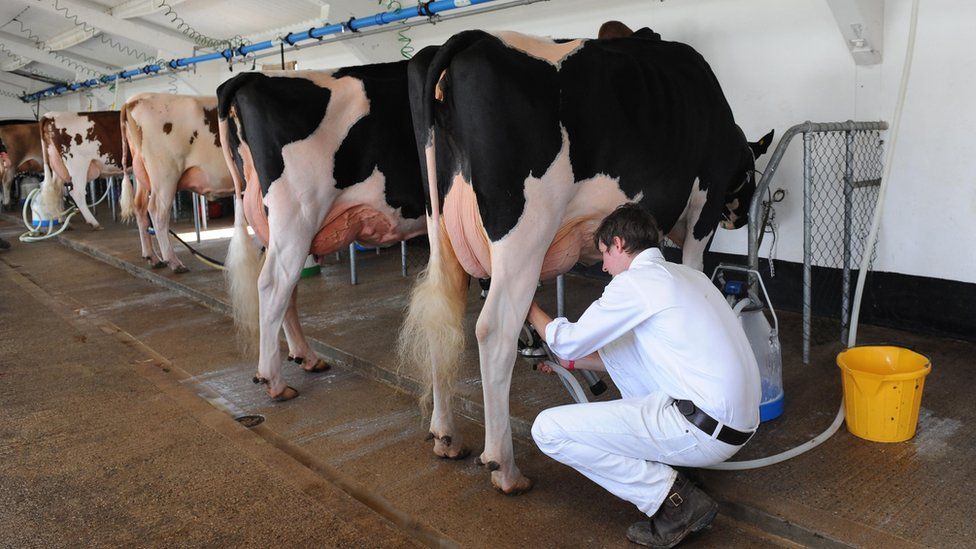Farm profits may halve after Brexit, says report
- Published
- comments

The profitability of the average UK farm could fall by as much as half after Brexit, new research suggests.
The report, by the Agriculture & Horticulture Development Board (AHDB), says the "worst-case scenario" would cut average farm profits from £38,000 a year to just £15,000.
The analysis tries to model the effects of cheaper imported food, reduced subsidies and more expensive labour.
A government spokesman said the report was based on highly unlikely scenarios.
The UK is due to leave the European Union (EU) in March 2019.
Some formal negotiations with the EU started in June, but so far, it is unclear how trade between the UK and the EU will change if the Brexit timetable is met.
In fact, the specific negotiations over a future trade deal have not even started.
But they will be particularly vital to the agricultural and horticultural industries because of the subsidies which are received under the EU's Common Agricultural Policy (CAP).
'Hypothetical scenarios'
A spokesperson for the Department for Environment, Food and Rural Affairs said: "This report is based on hypothetical and highly unlikely scenarios that do not reflect the government's negotiating position.
"Outside the EU and free from the bureaucracy of the Common Agricultural Policy, our farmers will be able to focus on growing, selling and exporting more fantastic produce."
The AHDB research looked at three possible outcomes of Brexit:
- "Business-as-usual", with trade arrangements staying much the same and subsidies continuing. Average annual profits might rise to £41,000
- Reduced subsidies and tariff-free access to the UK for foreign producers. Average annual profits fall to £15,000
- A "cliff-edge" Brexit with trade based on World Trade Organisation rules, and tariffs alongside a big cut in subsidies. Average annual profits fall to £20,000.
"Under the three scenarios outlined in the report, changes in the UK's trade relationships will impact farmers' bottom line when the UK leaves the single market, whether or not a free trade agreement is negotiated with the EU," said the Board.
'Dramatic immediate impact'
The CAP gives UK farmers £3.1bn a year which, on the face of it, will disappear after Brexit, though the UK government has guaranteed to maintain "overall" farm subsidies or payments at the same level until 2022.
AHDB, a statutory body funded by a levy on the agricultural industry, said Brexit would inevitably have a "dramatic immediate impact" on farm sectors that rely most on subsidies.
The effects of Brexit will not be uniform, though, and the position will be complex, depending on the sector and scenario being modelled.
Dairy and pig farmers may benefit from rising prices, the report says.
On the other hand, significant exporters such as cereal producers and sheep farmers would suffer due to the increased cost of exporting products to the EU.
And where businesses rely on migrant workers, higher employment costs due to more stringent immigration restrictions will also push up farmers' costs dramatically, especially in horticulture.
An AHDB spokeswoman said there were thought to be between 50,000 and 80,000 EU nationals working in UK agriculture and horticulture, in both permanent and seasonal jobs.
- Published30 December 2020
- Published9 October 2017
- Published21 July 2017
- Published27 March 2017